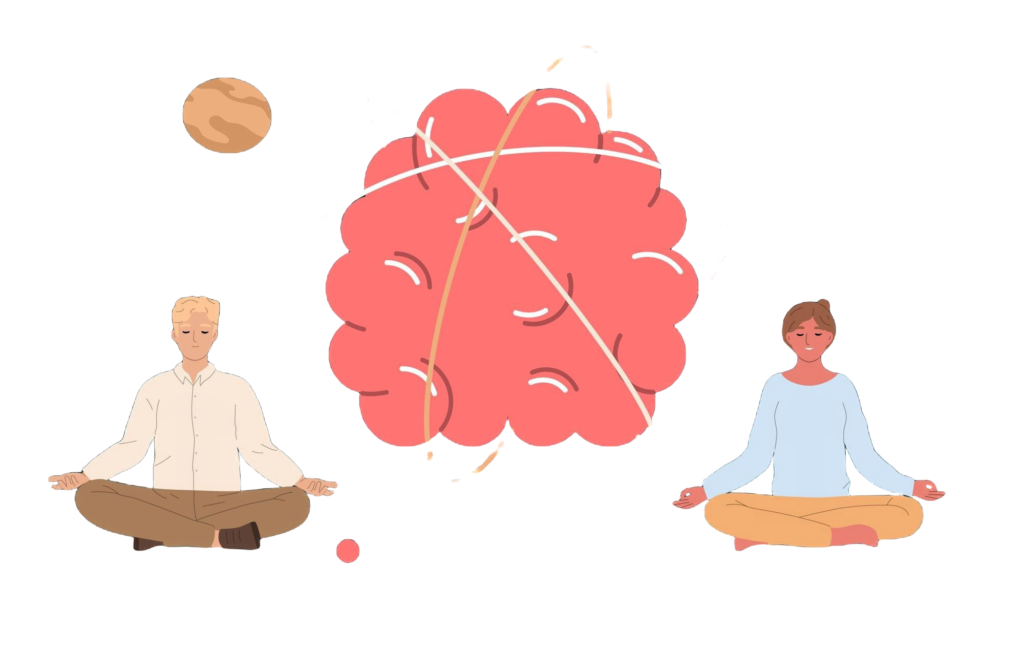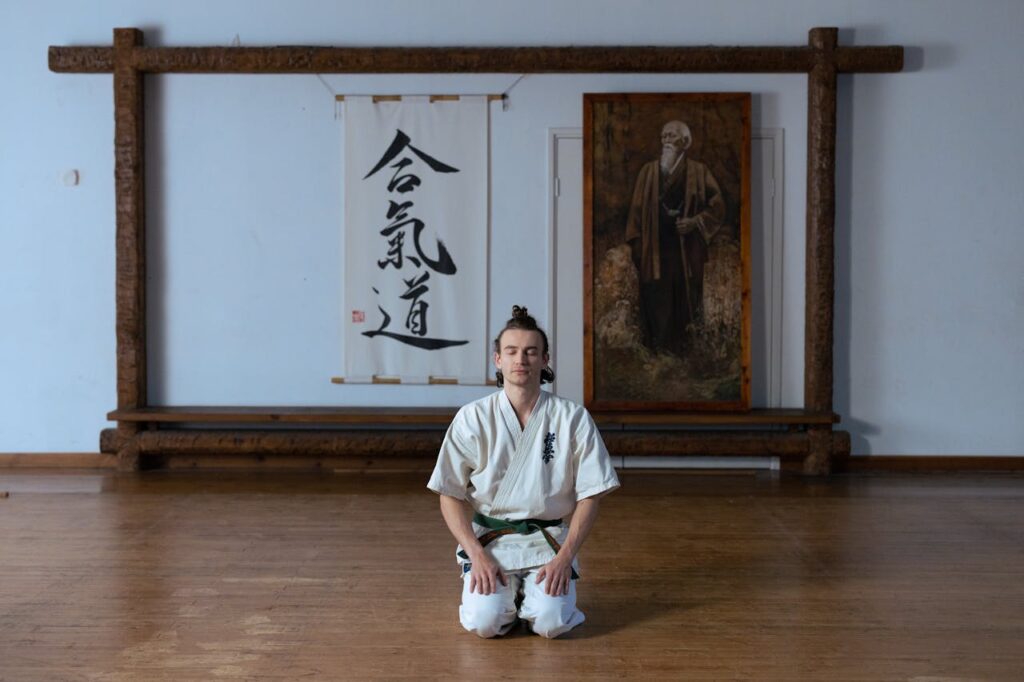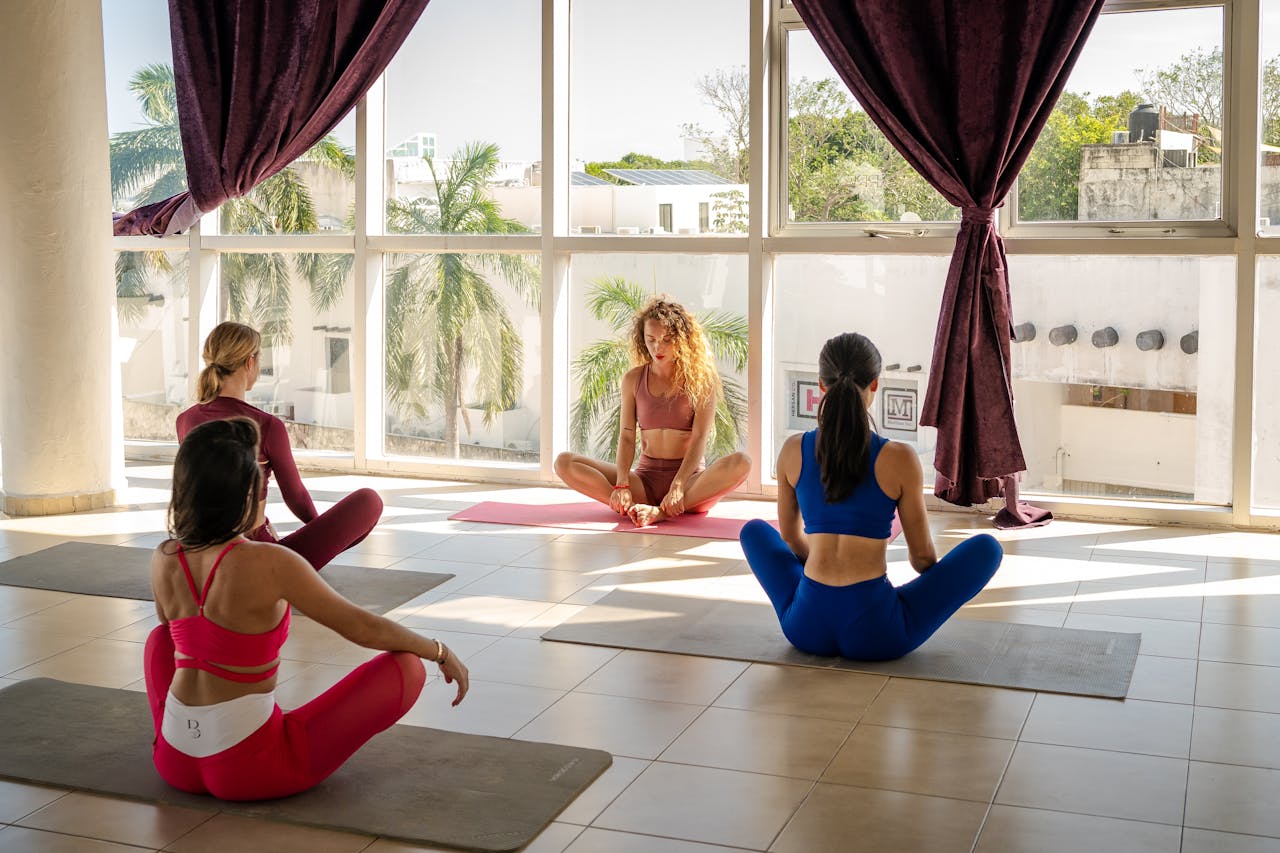
Table of Contents
Introduction
Personal growth is a continuous journey through life, always involving learning, self-discovery, and the overcoming of challenges. Whether trying to enhance your emotional intelligence, increase mental clarity, or find better well-being, personal growth plays a crucial role in living an enriching life.
Amongst hundreds of techniques and tools designed to enhance personal development, meditation has often been found as the effective practice most of the time. A tool for relaxation, meditation is a highly effective vehicle for expediting self-improvement.
In this blog, we’ll explore how meditation can significantly contribute to your personal growth journey, unlocking the many benefits of meditation that can fuel your transformation. From increasing self-awareness to boosting emotional resilience, meditation offers transformative power that can fast-track your path to personal growth.
The Power of Meditation in Personal Growth
At its core, meditation is a focused attention and mindfulness practice meant to help you connect fully with your inner self. It’s a tool through which to clear your mind and develop a greater awareness of who you are so that you tap into a more grounded and centered version of yourself.
1. Building Inner Awareness
Understanding yourself and where you want to be in life is the beginning step of personal growth. The first step in enhancing one’s self-awareness, which is the premise behind self-improvement, occurs when you meditate on it.
Through meditation, the thought process, emotions, or the resultant reaction is learned to watch without judgment. This exposes one to unconscious patterns of limitations.
With regular meditation, you start to become aware of emotional triggers, negative thinking patterns, and bad habits that constrain you. As you begin to tune into these aspects of your inner self, you can deliberately strive to replace them with better, enabling behaviors, so that growth becomes a permanent process in your life.
2. Emotional Intelligence Building
Emotional intelligence (EI) is the ability to understand, manage, and express your emotions effectively while also being able to empathize with others. High EI is critical for success in personal and professional life. Meditation plays a pivotal role in improving your emotional intelligence by helping you:
Regulate emotions: Meditation teaches you to remain calm and composed in emotionally charged situations so that you can respond thoughtfully rather than react impulsively.
Increase empathy: By quieting the mind and focusing inward, you gain a deeper understanding of your own emotions that translates into greater empathy with others.
Strengthen self-compassion: Through mindfulness practices, meditation helps you cultivate a compassionate attitude toward yourself, thereby fostering emotional healing and resilience.
As you work on improving your emotional intelligence, you naturally open yourself up to more positive interactions, deeper relationships, and greater success on your personal growth journey.
3. Improving Mental Clarity and Concentration
Clarification of the mind clarifies decision-making, winning goals, and productivity levels. Mindfulness significantly improves one’s mental clarity by limiting mental noise and helping an individual concentrate on the moment.
With a free mind from the constant chatter of worries and distractions, you can think more clearly, prioritize effectively, and make better decisions. Through improved focus, Mindfulness helps you stay on track with your personal development goals, making it easier to identify the steps needed to move forward.
In addition, meditation builds on mindfulness, which enables you to stay in the present moment and not rummage over the past or worry over what is yet to happen. This is very important for making significant movement towards any goal you would set in your life.
4. Reduces Stress and Anxiety
Stress and anxiety are significant foes to success in personal development, as they cloud your ability to clearly think, decide, and maintain a good perspective on life. The benefits of Mindfulness extend to stress reduction by activating the relaxation response of the body and reducing cortisol levels-the hormone responsible for stress.
With a regular meditation practice, you can better handle the stress and be more balanced in tackling challenges. A reduction in stress and anxiety contributes to making one focus on self-improvement, building strength, and taking up productive activities despite negative emotions.
The Benefits of Meditation for Self-Improvement
Meditation is not just a tool for relaxation or stress release; it is a powerful stimulant for personal growth and self-improvement. Here are some direct benefits of meditation that result in enhancing your personal growth:
1. Building resilience and mental toughness
Meditation trains you to observe your thoughts and emotions without becoming attached to them, thus helping you build mental resilience. This practice allows you to respond more effectively to challenges, setbacks, and adversity.
Over time, you cultivate a greater sense of inner strength and mental toughness, which is essential for persevering through life’s obstacles.
2. Creating a Positive Mindset
It would greatly involve personal growth because one thinks positively about challenges and opportunities to be met. Mindfulness improves your attitude by enabling letting go of negative thinking patterns; instead, you’ll affirm positive thoughts.
Gratitude and mindfulness practiced each day open your mind to attraction that works for success, happiness, and fulfillment.
3. Creativity and Solving Problems
When you’re caught up in the hustle and bustle of everyday life, it can be difficult to think outside the box or come up with creative solutions. Mindfulness enhances your creativity by calming the mind and opening up space for new ideas. With greater mental clarity and focus, you’re better able to think critically and approach problems from innovative angles, accelerating your personal growth in the process.
4. Willpower and Discipline Strength
Self-discipline and willpower are needed to build up your personality. This is mainly because they ensure that one is able to maintain self-discipline while staying firm on their objectives.
When one meditates, these qualities are built by enhancing one’s ability to counter distractions and keeping the target objective in view. Over time, while building meditation, one masters the impulsive and uncontrolled demands, thus one is well disciplined in every walk of life.
How to Start a Meditation Practice for Personal Growth
Getting started with meditation may feel intimidating at first, but it doesn’t have to be complicated. Here are some simple steps to begin incorporating meditation into your personal growth journey:
1. Start with Short Sessions
Beginners begin with short meditations of 5–10 minutes per day. A quiet space where you sit and not distracted is important. Focus your thoughts on your breathing and try to keep other thoughts from entering your mind. The duration can then be increased as one becomes accustomed to the practice.
2. Mindfulness
Mindfulness is the practice of being fully present in the moment without judgment. During your meditation sessions, focus on the sensations of your breath or the sounds around you. When your mind starts to wander, gently bring your attention back to the present moment without criticizing yourself.
3. Explore Guided Meditation
If you find it challenging to meditate independently, you can try the guided meditation. There are numerous tools and methods found online, through video and application, leading you through stages and helping you stay focused on your practice.
4. Consistency Is Key
Consistency is the key to deriving the benefits of meditation. Aim for meditating at the same time every day, whether it is in the morning setting the tone for a positive day or before bed calming out. The more consistent that you meditate, the more benefits that you will derive.
The Science of Meditation and Personal Development
Though for many, the benefits of Mindfulness appear anecdotal, science supports it in a most clear and convincing manner. Research shows how meditation impacts the brain deeply and affects overall mental well-being.
Let’s consider some of the scientific explanations that explain how Mindfulness is a catalyst for self-improvement and how it accelerates your personal growth.
1. Changes in Brain Structure

Use of brain imaging techniques in studies has indicated the alteration of brain structures due to consistent Mindfulness. Mindfulness increases the thickness of the prefrontal cortex, which is responsible for decision-making, problem-solving, and emotional regulation. Cognitive functions improved by meditation include better decision-making, focus, and emotional control.
At the same time, there is evidence that regular meditation will reduce the size of the amygdala, the brain’s “fear center” that processes stress and emotion. This reduction in amygdala size can eventually lead to lower levels of anxiety and stress, as well as increased emotional stability, one of the chief elements of personal growth.
2. Enhancing Neurotransmitter Flow
Mindfulness has also been said to increase the flow of certain neurotransmitters, such as serotonin and dopamine, which controls mood, motivation, or happiness. Higher levels of serotonin can lead to improved emotional well-being, while dopamine can enhance your sense of fulfillment, joy, and motivation about achieving your goals.
When you feel motivated and happy, you are more likely to do positive things that help you grow. Mindfulness, by influencing neurotransmitter production positively, supports the creation of a mental and emotional environment conducive to progress.
3. Meditation and Neuroplasticity
Neuroplasticity is the brain’s ability to reorganize itself by forming new neural connections throughout life. Mindfulness has been proved to increase neuroplasticity, enabling the brain to form new neural pathways that enhance learning, memory, and adaptability.
The more you meditate, the more you will be rewiring your brain to be more open to new ideas, learning experiences, and ways of thinking, all essential to personal development and growth.
Through this process, Mindfulness helps you break old, unhelpful mental habits and build new, empowering ones for personal development. This capability to wire and rewire your brain not only makes meditation an incredibly powerful tool for cognitive growth but also for transformation of emotions and behavior.
4. Reduces stress and cortisol levels
One of the prominent advantages of Mindfulness is the reduction of cortisol levels-associate hormone with stress. When one meditates, he practices relaxation response that negates the stress response from the body. With reduced cortisol levels, meditation seeks to balance out the body and mind hence enhancing clear thinking and decision-making capability, without which a lot of stress comes into obstructing personal goals.
Low levels of cortisol are also able to contribute to better physical health, and this is important for the maintenance of energy and motivation necessary to keep up long-term self-improvement.
How Meditation Promotes Self-Development across Different Life Stages
It is by no means a one-time application for solving specific problems; it is rather a lifetime solution that contributes towards personal growth at every step of your life. Here’s how Mindfulness can play its role in various phases of your journey to personal growth:

1. Early Phases of Self-Discovery
It can be one of the most powerful tools for self-discovery when starting your personal growth journey. During these early stages, it helps you to know yourself deeper, what you value, and what your goals are. Mindfulness lets you connect with your authentic self and get clear about your desires and aspirations by quieting the noise around you.
This clarity is important in setting goals that align with your true purpose, helping one build a strong foundation for their personal growth journey.
2. Building Healthy Habits and Consistency
Meditation will help you develop consistency and discipline as you move to the next stage of personal growth. Whether you want to improve your physical health, increase your productivity, or learn new skills, Mindfulness helps build your willpower and concentration, helping you maintain consistency even in the face of challenges.
Furthermore, consistent Mindfulness can help you stay emotionally stable in the process of breaking up old, toxic habits and replacing them with healthful alternatives. It is through personal discipline that Mindfulness accelerates progress toward long-term goals.
3. Overcoming Setbacks and Maintaining Resilience
There will be setbacks on your journey to self-improvement. Sometimes they will come as failures, loss, or challenging situations, but the key is resilience, and that is how you bounce back onto your way. Mindfulness will teach you how to watch your emotions without getting caught up in them.
Through mindfulness and focused attention, meditation allows you to respond to setbacks with patience, understanding, and a problem-solving approach. And instead of getting stuck in negative emotion, meditation helps you cut through challenges with clarity, hastening your personal growth.
4. Refining Goals and Achieving Long-Term Success
As you journey further on your personal development path, your goals and ambitions are likely to change. Meditation gives you the mental clarity to examine whether your goals are aligned with your core values or not. It helps you reflect on your progress, refine your goals, and keep your personal growth journey in line with your true self.
Furthermore, the continuity of thought that Mindfulness generates must be cultivated in order to sustain long-term success. Career development, fostering deeper relationships, and inner peace are some examples of goals toward which meditation helps keep you on track and positive.
Integrating Meditation into Your Life for Maximum Personal Development
To make the most out of Mindfulness and quicken your personal development, you need to be consistent. Meditation is not something that brings you immediate results; instead, you will start to feel and notice the changes in your thoughts, behavior, and emotional states with regular practice. Here’s how you can make meditation a part of your daily routine:

1. Set a Routine
The best way to make Mindfulness a habit is to include it in your daily routine. Whether it’s in the morning before the start of your day, during lunch breaks to recharge, or in the evening to unwind, having a set meditation time helps create a long-lasting habit.
2. Use Meditation Apps and Resources
There are many resources, from apps and online guides, that can get you started with the practice of Mindfulness. Apps like Headspace, Calm, or Insight Timer offer guided sessions and reminders for help in making meditation more accessible and easier to follow.
3. Start small and build gradually
If you’re new to meditation, start with small, manageable sessions—the 5-10 minute-a-day variety will do the trick; then gradually increase the time as you feel more comfortable with the practice. Remember, it’s not about how many minutes you can spare but about the quality of your practice.
4. Couple meditation with other growth practices
Pair meditation with another personal improvement practice such as writing in your journal, using affirmations, or setting goals. Combining these will strengthen your insights from meditation and will be the most effective in going about your growth journey.
Conclusion
Actually, beyond all tools helping out with relaxation, meditation may bring a lot of power concerning personal growth and self-improvement. Meditation enhances self-awareness, emotional intelligence, mental clarity, and a person’s resilience in confronting obstacles and achieving goals as fast as possible. But with regular practice, its many benefits can be experienced for long-term success on the path to personal fulfillment.
As you become consistent with the practice of meditation, always remember that growth happens progressively. Be constant, be patient with yourself, and trust that meditation will lead you to become the best.

